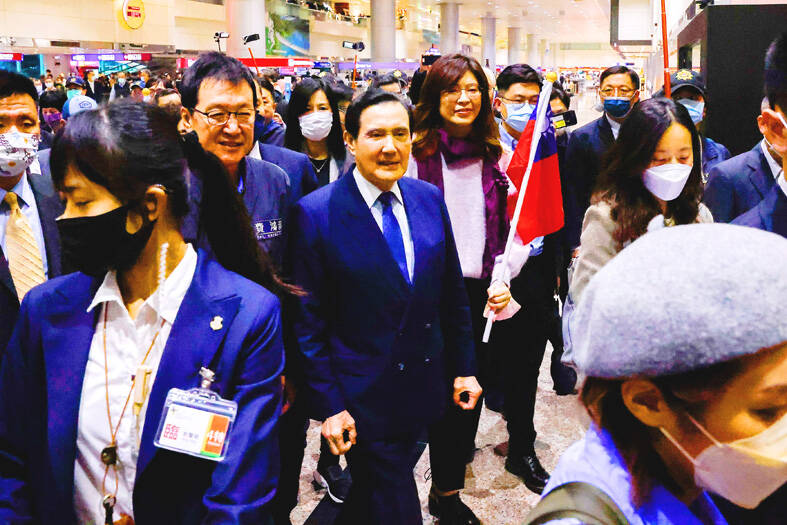Former president Ma Ying-jeou (馬英九) was belittled by Beijing during his trip to China, as he was only able to meet China’s Taiwan Affairs Office (TAO) Director Song Tao (宋濤) and was not greeted by higher- ranking Chinese officials during his visit, which has harmed Taiwan, academics said on Friday.
Ma said the trip was to pay his respects to his ancestors and to accompany 28 Taiwanese university students for exchanges with students in China, but they only met with 35 students at Wuhan University, 32 students at Hunan University and 30 students at Fudan University.
The Chinese government could easily mobilize thousands of students to attend Ma’s exchange sessions if it wanted, but there were only about 30 students in each session, Cross-Strait Policy Association researcher Wu Se-chih (吳瑟致) said, adding that it seems that Ma was used as Beijing’s tool to counter President Tsai Ing-wen’s (蔡英文) visit to Central America and stopovers in the US.

Photo: Ann Wang, REUTERS
Before Ma left for China, there were rumors that Chinese Vice Premier Ding Xuexiang (丁薛祥) would welcome Ma at the airport, and some had guessed that he would be greeted by Chinese Communist Party (CCP) Politburo Standing Committee member Wang Huning (王滬寧), who met Chinese Nationalist Party (KMT) Vice Chairman Andrew Hsia (夏立言) in Beijing in February, Cross-Strait Policy Association secretary-general Wang Zhin-sheng (王智盛) said.
However, Ma was not greeted by either of them, and only met with Song in Wuhan on short notice, Wang Zhin-sheng said.
Ma “went for the sake of going,” regardless of which members of the Chinese government arranged to meet with him, and he disguised his dream of saying he is Chinese by pretending it was a trip to pay respects to his ancestors along with student interactions, he said.
Ma cooperated with the Chinese government in praising Wuhan’s COVID-19 response, but Beijing still does not view him as a former president or former KMT chairman, but used him as part of its “united front” tactics for political gain, Wang Zhin-sheng said.
Ma is willing to be a “chess piece” of China, to put pressure on Taiwan, belittle its nation status and harm it, Wu said, adding that he must face criticism from Taiwanese, as they have seen how a politician and a former president can be so selfish for his own political gain.
Ma and the KMT are pleased with his trip, claiming that he elaborated on the so-called “1992 consensus,” with “each side [of the Taiwan Strait] having its own interpretation on ‘one China,’” yet although the Chinese government did not refute it in his face, it does not mean it accepts it, Wang said.
The definition and interpretation of the so-called “1992 consensus” are still in the hands of China, so Ma’s trip did not revive the “1992 consensus,” he said, adding that it is merely “terminal lucidity” as it goes into history.

An essay competition jointly organized by a local writing society and a publisher affiliated with the Chinese Communist Party (CCP) might have contravened the Act Governing Relations Between the People of the Taiwan Area and the Mainland Area (臺灣地區與大陸地區人民關係條例), the Mainland Affairs Council (MAC) said on Thursday. “In this case, the partner organization is clearly an agency under the CCP’s Fujian Provincial Committee,” MAC Deputy Minister and spokesperson Liang Wen-chieh (梁文傑) said at a news briefing in Taipei. “It also involves bringing Taiwanese students to China with all-expenses-paid arrangements to attend award ceremonies and camps,” Liang said. Those two “characteristics” are typically sufficient

A magnitude 5.9 earthquake that struck about 33km off the coast of Hualien City was the "main shock" in a series of quakes in the area, with aftershocks expected over the next three days, the Central Weather Administration (CWA) said yesterday. Prior to the magnitude 5.9 quake shaking most of Taiwan at 6:53pm yesterday, six other earthquakes stronger than a magnitude of 4, starting with a magnitude 5.5 quake at 6:09pm, occurred in the area. CWA Seismological Center Director Wu Chien-fu (吳健富) confirmed that the quakes were all part of the same series and that the magnitude 5.5 temblor was

The brilliant blue waters, thick foliage and bucolic atmosphere on this seemingly idyllic archipelago deep in the Pacific Ocean belie the key role it now plays in a titanic geopolitical struggle. Palau is again on the front line as China, and the US and its allies prepare their forces in an intensifying contest for control over the Asia-Pacific region. The democratic nation of just 17,000 people hosts US-controlled airstrips and soon-to-be-completed radar installations that the US military describes as “critical” to monitoring vast swathes of water and airspace. It is also a key piece of the second island chain, a string of

The Central Weather Administration has issued a heat alert for southeastern Taiwan, warning of temperatures as high as 36°C today, while alerting some coastal areas of strong winds later in the day. Kaohsiung’s Neimen District (內門) and Pingtung County’s Neipu Township (內埔) are under an orange heat alert, which warns of temperatures as high as 36°C for three consecutive days, the CWA said, citing southwest winds. The heat would also extend to Tainan’s Nansi (楠西) and Yujing (玉井) districts, as well as Pingtung’s Gaoshu (高樹), Yanpu (鹽埔) and Majia (瑪家) townships, it said, forecasting highs of up to 36°C in those areas